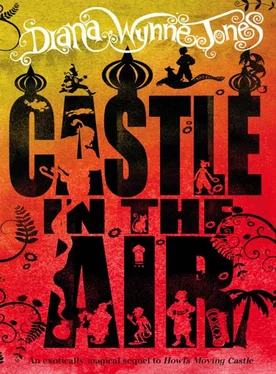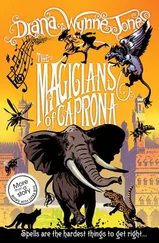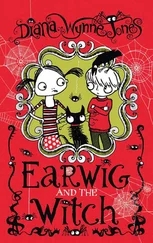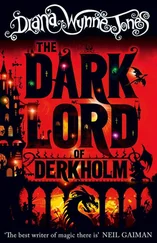

Illustrated by Tim Stevens

For Francesca
COVER
TITLE PAGE
DEDICATION
CHAPTER ONE In which Abdullah buys a carpet
CHAPTER TWO In which Abdullah is mistaken for a young lady
CHAPTER THREE In which Flower-in-the-Night discovers several important facts
CHAPTER FOUR Which concerns marriage and prophecy
CHAPTER FIVE Which tells how Flower-in-the-Night’s father wished to raise Abdullah above all others in the land
CHAPTER SIX Which shows how Abdullah went from the frying pan into the fire
CHAPTER SEVEN Which introduces the genie
CHAPTER EIGHT In which Abdullah’s dreams continue to come true
CHAPTER NINE In which Abdullah encounters an old soldier
CHAPTER TEN Which tells of violence and bloodshed
CHAPTER ELEVEN In which a wild animal causes Abdullah to waste a wish
CHAPTER TWELVE In which the law catches up with Abdullah and the soldier
CHAPTER THIRTEEN In which Abdullah challenges Fate
CHAPTER FOURTEEN Which tells how the magic carpet reappeared
CHAPTER FIFTEEN In which the travellers arrive at Kingsbury
CHAPTER SIXTEEN In which strange things befall Midnight and Whippersnapper
CHAPTER SEVENTEEN In which Abdullah at last reaches the Castle in the Air
CHAPTER EIGHTEEN Which is rather full of princesses
CHAPTER NINETEEN In which a soldier, a cook and a carpet seller all state their price
CHAPTER TWENTY In which a djinn’s life is found and then hidden
CHAPTER TWENTY-ONE In which the castle comes down to earth
OTHER WORKS
COPYRIGHT
ABOUT THE PUBLISHER
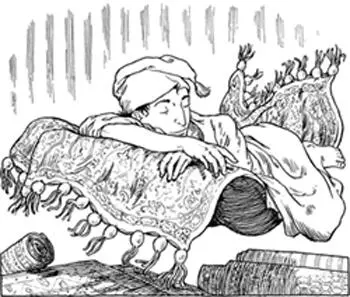
CHAPTER ONE In which Abdullah buys a carpet
Far to the south of the land of Ingary, in the Sultanates of Rashpuht, a young carpet merchant called Abdullah lived in the city of Zanzib. As merchants go, he was not rich. His father had been disappointed in him and, when he died, he had only left Abdullah just enough money to buy and stock a modest booth in the north-west corner of the Bazaar. The rest of his father’s money, and the large carpet emporium in the centre of the Bazaar, had all gone to the relatives of his father’s first wife.
Abdullah had never been told why his father was disappointed in him. A prophecy made at Abdullah’s birth had something to do with it. But Abdullah had never bothered to find out more. Instead, from a very early age, he had simply made up daydreams about it. In his daydreams, he was really the long-lost son of a great prince, which meant, of course, that his father was not really his father. It was a complete castle in the air and Abdullah knew it was. Everyone told him he had inherited his father’s looks. When he looked in a mirror, he saw a decidedly handsome young man, in a thin, hawk-faced way, and knew he looked very like the portrait of his father as a young man – always allowing for the fact that his father wore a flourishing moustache, whereas Abdullah was still scraping together the six hairs on his upper lip and hoping they would multiply soon.
Unfortunately, as everyone also agreed, Abdullah had inherited his character from his mother – his father’s second wife. She had been a dreamy and timorous woman, and a great disappointment to everyone. This did not bother Abdullah particularly. The life of a carpet merchant holds few opportunities for bravery and he was, on the whole, content with it. The booth he had bought, though small, turned out to be rather well placed. It was not far from the West Quarter where the rich people lived in their big houses surrounded by beautiful gardens. Better still, it was the first part of the Bazaar the carpet-makers came to when they came into Zanzib from the desert to the north. Both the rich people and the carpet-makers were usually seeking the bigger shops in the centre of the Bazaar, but a surprisingly large number of them were ready to pause at the booth of a young carpet merchant when that young merchant rushed out into their paths and offered them bargains and discounts with most profuse politeness.
In this way, Abdullah was quite often able to buy best quality carpets before anyone else saw them, and sell them at a profit too. In between buying and selling he could sit in his booth and continue with his daydream, which suited him very well. In fact, almost the only trouble in his life came from his father’s first wife’s relations, who would keep visiting him once a month in order to point out his failings.
“But you’re not saving any of your profits!” cried Abdullah’s father’s first wife’s brother’s son, Hakim (whom Abdullah detested), one fateful day.
Abdullah explained that, when he made a profit, his custom was to use that money to buy a better carpet. Thus, although all his money was bound up in his stock, it was getting to be better and better stock. He had enough to live on. And, as he told his father’s relatives, he had no need of more, since he was not married.
“Well you should be married!” cried Abdullah’s father’s first wife’s sister, Fatima (whom Abdullah detested even more). “I’ve said it once and I’ll say it again – a young man like you should have at least two wives by now!” And, not content with simply saying so, Fatima declared that this time she was going to look out for some wives for him – an offer which made Abdullah shake in his shoes.
“And the more valuable your stock gets, the more likely you are to be robbed, or the more you’ll lose if your booth catches fire – have you thought of that?” nagged Abdullah’s father’s first wife’s uncle’s son, Assif (a man whom Abdullah hated more than the first two put together).
He assured Assif that he always slept in the booth and was very careful of the lamps. At which all three of his father’s first wife’s relatives shook their heads, tut-tutted and went away. This usually meant they would leave him in peace for another month. Abdullah sighed with relief and plunged straight back into his daydream.
The daydream was enormously detailed by now. In it, Abdullah was the son of a mighty prince who lived so far to the east that his country was unknown in Zanzib. But Abdullah had been kidnapped at the age of two by a villainous bandit called Kabul Aqba. Kabul Aqba had a hooked nose like the beak of a vulture and wore a gold ring clipped into one of its nostrils. He carried a pistol with a silver-mounted stock with which he menaced Abdullah, and there was a bloodstone in his turban which seemed to give him more than human power. Abdullah was so frightened that he ran away into the desert, where he was found by the man he called his father now. The daydream took no account of the fact that Abdullah’s father had never ventured into the desert in his life: indeed, he had often said that anyone who ventured beyond Zanzib must be mad. Nevertheless, Abdullah could picture every nightmare inch of the dry, thirsty, footsore journey he had made before the good carpet merchant found him. Likewise, he could picture in great detail the palace he had been kidnapped from, with its pillared throne room floored in green porphyry, its women’s quarters and its kitchens, all of the utmost richness. There were seven domes on its roof, each one covered with beaten gold.
Читать дальше
